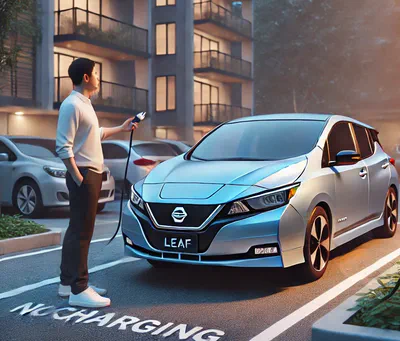
Is Charging an EV a Tenant’s Right?
- Articles, Stories
- EV Charging , Tenant Rights , Landlord Obligations , Electric Vehicles
- November 12, 2024
- 4 min read
Is Charging an EV a Tenant’s Right?
One Ottawa tenant believes so, as his rent includes electricity.
There’s a straightforward solution to this dilemma, but it requires a certain mindset—one that may feel rare in tenant-landlord relationships. As EV ownership rises, simple adjustments could make charging convenient and affordable for tenants while protecting landlords from extra expenses. This approach demands a focus on one key value that can make all the difference.
Joel Mac Neil, an Ottawa resident, has been charging his electric vehicle (EV) at his apartment complex, the Park West, for three years without issue—until recently. Mac Neil argues that, since his rent covers electricity, it’s within his rights, but his landlord disagrees.
On October 7, the property owner noticed the EV charger at Mac Neil’s parking space and disabled nearby outlets, asserting they wouldn’t subsidize his commute.
Mac Neil had received permission from his rental agent when he bought the EV and believes the landlord’s action violates his rights. He sees his situation as part of a broader issue that more Canadians will face as EV ownership rises. “They’re the building owners, so they think they can do what they want,” he said.
Potential Landlord Concerns
Mac Neil’s landlord, however, may have a different perspective. With only one EV user in the building, they may see no urgency to address the needs of a minority, considering the situation an unnecessary complication. Without personal experience driving an EV, they might not grasp the nuances involved in EV charging, which differs significantly from filling up a gas tank and requires a learning curve.
It’s also possible the landlord explored the logistics and costs associated with metered charging options and found them prohibitive. Installation costs for metered charging can be high, and they may feel that charging a flat fee of $80—though it’s more than Mac Neil can comfortably pay—sets a precedent for cost recovery if they eventually invest in the equipment.
Costs of Charging EVs
Raymond Leury, president of the Electric Vehicle Council of Ottawa (EVCO), understands Mac Neil’s situation. He notes that EVCO has received similar inquiries from condo residents. Charging an EV costs around $2 per 100 kilometers, with typical annual costs around $25 per month.

EVCO recommends setting a flat fee for charging. Mac Neil offered to pay $20–$25 monthly, but his landlord proposed $80, which he found excessive. He now resorts to alternative charging solutions, though they complicate his routine.
A Matter of Rights?
According to Ottawa-based tenants’ rights lawyer Daniel Tucker-Simmons of Avant Law, no legislation directly addresses EV charging in rental housing. However, since Mac Neil’s lease includes electricity without an EV clause and he previously received verbal permission, he could have a case if he applies to the Ontario Landlord and Tenant Board.
In the absence of regulations, Tucker-Simmons advises tenants to discuss EV charging needs at lease signing and get agreements in writing. While landlords are within their rights to refuse EV charging in some cases, an open conversation could help avoid conflicts down the road.
The Mindset Shift: Trust and a Nearly Free Solution
In reality, there’s a straightforward, low-cost solution that revolves around trust. With the right mindset, landlords and tenants can reach a fair arrangement without the need for expensive metering or legal battles. EVnSteven makes this possible by allowing trusted tenants to charge their EVs conveniently while covering minimal electricity costs—at nearly zero expense for landlords. This trust-based approach could help communities embrace EVs without high costs or complications.
So perhaps the real question isn’t just about tenant rights. Maybe the focus should shift to finding affordable solutions that allow both landlords and tenants to benefit, helping everyone win. If we look beyond a rights-based approach, we may find more practical, collaborative ways to make EV charging accessible for all.
This article is based on a story by CBC News. Click the link to view the original article and see the full story with video interviews.


